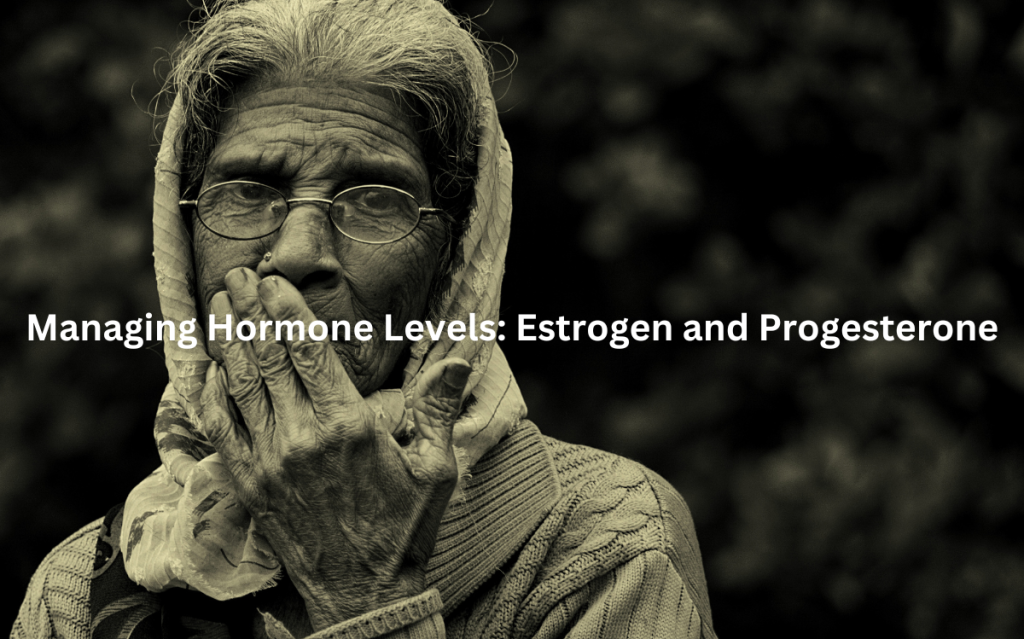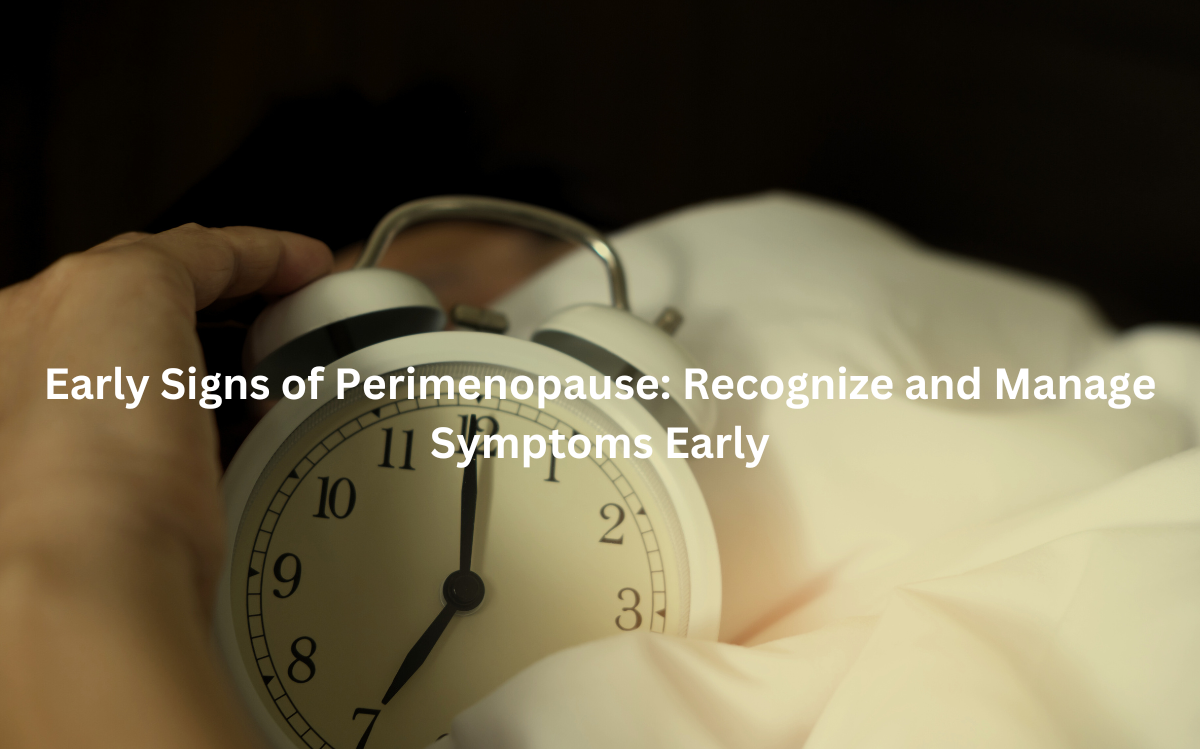Uncover key early signs of perimenopause and learn how to manage them for a smoother transition.
Perimenopause marks the beginning of a woman’s transition into menopause, and spotting the early signs can make all the difference. (1)
Recognising symptoms like irregular periods, hot flashes, and mood swings can help you take proactive steps. Understanding these changes is the first step toward managing your health and easing the journey through this phase of life.
Key Takeaways
- Early symptoms of perimenopause include hot flashes, irregular periods, and mood swings.
- Hormone therapy, lifestyle changes, and a balanced diet can significantly ease symptoms.
- Identifying and addressing health risks like heart disease and osteoporosis early can improve long-term wellness.
Understanding Perimenopause: Early Signs and Symptoms
Perimenopause, the transition period before menopause, can feel like a storm quietly brewing. For some, it’s a series of gradual, confusing changes. Others might experience more intense disruptions. The early signs often include irregular periods, hot flashes, low libido, and weight gain.
These symptoms signal a shift in hormonal levels, particularly estrogen and progesterone, which regulate menstrual cycles and other bodily functions.
Hormonal changes vary widely. While some women may face significant shifts early, others may experience only mild disruptions over several years. Estrogen and progesterone levels fluctuate, causing the irregularity in menstrual cycles that marks the early phase.
This shift may cause hot flashes—unexpected waves of heat that rise through the chest and neck—or lead to vaginal dryness, making intimacy uncomfortable.
Recognizing these changes early on can provide more effective management strategies. Awareness allows women to anticipate symptoms and adjust their lifestyle or seek treatments that can ease the transition.
Common Perimenopause Symptoms: What to Expect
Hot Flashes and Night Sweats
Hot flashes, perhaps the most infamous symptom of perimenopause, are sudden sensations of intense heat, often followed by sweating.
These typically last between 30 seconds to several minutes but can leave women feeling exhausted. Night sweats, which happen during sleep, can disrupt rest and cause fatigue the next day. These symptoms are due to hormonal changes, particularly the drop in estrogen.
Mood Swings and Mental Health
Perimenopause also affects mental well-being. Many women report feeling more irritable, anxious, or even depressed.
These mood swings are tied to fluctuating hormone levels that impact brain chemistry. Estrogen plays a key role in serotonin production (the “feel-good” hormone), so as estrogen levels decline, mood changes are common.
While these emotional shifts are often temporary, they can sometimes interfere with daily life.
Vaginal Dryness and Sexual Health
Vaginal dryness, another symptom, results from decreased estrogen, which affects the tissues of the vagina, making them thinner and less elastic.
This can make sex painful and cause discomfort during daily activities. The physical changes can lead to a reduced desire for intimacy, which can further impact emotional and physical well-being.
Irregular Periods
Irregular periods are usually the first sign that perimenopause has begun. Periods may become lighter or heavier, and cycles may lengthen or shorten.
This happens because the ovaries are not releasing eggs as consistently. As estrogen and progesterone fluctuate, so do the regularity and characteristics of the menstrual cycle.
Lifestyle Changes to Manage Perimenopause Symptoms
When it comes to managing perimenopause, lifestyle changes can be the most effective form of treatment. (2)
Diet, Exercise, and Stress Management
A balanced diet, regular exercise, and stress management are crucial. Since weight gain is common during perimenopause, keeping active and eating a healthy diet can prevent additional pounds from accumulating. A diet rich in whole grains, fruits, vegetables, and lean proteins can help balance hormones and support overall health.
Weight Management
As estrogen levels drop, metabolism often slows, which can lead to weight gain. Women may notice an increase in abdominal fat, which is linked to a higher risk of heart disease.
To counter this, incorporating regular cardiovascular and strength-training exercises into your routine can boost metabolism and preserve muscle mass, which naturally declines with age.
Exercise Routines
Strength training (like lifting weights) helps combat muscle loss and maintain bone density, which is also impacted by the drop in estrogen. Cardio exercises like walking, swimming, or cycling improve cardiovascular health and help control weight.
Flexibility exercises, such as yoga or Pilates, help with balance, posture, and relaxation, reducing stress and anxiety that often accompany perimenopause.
Healthy Eating Tips
For hormone balance, focus on foods rich in phytoestrogens, such as soy products, flaxseeds, and lentils. These plant-based compounds mimic estrogen in the body.
Maintaining a healthy diet can also prevent nutrient deficiencies and improve bone health, which becomes especially important as bone density decreases during perimenopause.
Managing Hormone Levels: Estrogen and Progesterone

During perimenopause, estrogen and progesterone levels fluctuate, leading to a variety of symptoms. As these hormones decrease, women may find relief through hormone replacement therapy (HRT).
Fluctuating Hormone Levels
The decline in estrogen during perimenopause affects various systems in the body, including the reproductive system, bones, heart, and brain. Progesterone, which works in tandem with estrogen, also declines, contributing to irregular periods and other symptoms like irritability or sleep disturbances.
Estrogen and Progesterone in Symptom Relief
Hormone replacement therapy (HRT) can help restore estrogen and progesterone levels. This treatment has been shown to reduce hot flashes, improve mood, and relieve vaginal dryness. Estrogen therapy alone can be prescribed for women who’ve had a hysterectomy, while a combination of estrogen and progesterone is typically used for those with a uterus.
HRT: Benefits and Risks
While HRT can be highly effective, it’s not without risks. For some women, especially those with a history of breast cancer or blood clots, HRT may not be suitable. There are various methods of delivering hormones, including pills, patches, creams, or vaginal rings, each with different benefits and risks.
When to Consider HRT
Women should consider HRT when symptoms are severe and disrupt their quality of life. Working with a healthcare provider to determine the appropriate type and dose of HRT is crucial, as it can be customized to individual needs.
Blood Tests and Hormonal Imbalances: Understanding Your Health
When symptoms arise, doctors may recommend blood tests to check hormone levels, particularly estrogen and progesterone, to confirm perimenopause.
Blood Tests for Hormone Levels
Blood tests can measure the levels of various hormones. However, perimenopause is primarily diagnosed based on symptoms rather than a specific test. Blood tests can offer insight into estrogen and progesterone levels but often show fluctuating results due to the nature of perimenopause. A healthcare provider will interpret these results in light of your symptoms.
Interpreting Blood Test Results
Blood tests are just one piece of the puzzle. A comprehensive review of symptoms, lifestyle, and medical history is necessary for a clear picture. Women can work with their doctor to determine if hormone therapy or other treatments are needed.
Heart Health and Perimenopause: Risks and Prevention
The hormonal changes that come with perimenopause also affect heart health. As estrogen levels drop, the risk of heart disease increases, especially if lifestyle factors like smoking, poor diet, or lack of exercise are present.
The Connection Between Hormones and Heart Disease
Estrogen is protective for the heart, and its decline during perimenopause may lead to higher cholesterol levels and increased risk of cardiovascular disease. It’s crucial to monitor blood pressure, cholesterol levels, and adopt heart-healthy habits.
Preventative Steps
To protect heart health, women should focus on a heart-healthy diet (low in saturated fats, rich in fruits, vegetables, and whole grains) and regular physical activity. Stress reduction techniques, such as meditation or deep breathing, can also help lower the risk of heart disease.
Bone Health: Protecting Your Bones During Perimenopause
As estrogen levels decrease, bone density can be affected, putting women at risk for osteoporosis and fractures.
Impact of Estrogen Loss on Bone Density
Estrogen plays a crucial role in maintaining bone strength. When estrogen levels drop, bone resorption (the breakdown of bone tissue) increases, leading to weaker bones over time.
Preventing Osteoporosis
Calcium and vitamin D are essential for bone health. Women should aim for 1,200 mg of calcium and 800-1,000 IU of vitamin D daily. Weight-bearing exercises, such as walking, jogging, or strength training, help maintain bone density.
Navigating the Transition: When to Seek Healthcare Guidance
While many perimenopausal symptoms are manageable with lifestyle changes, there are times when medical intervention is necessary.
When to Seek Help
If symptoms become severe or unmanageable, it may be time to seek healthcare guidance. This includes situations where hot flashes or mood swings interfere with daily life, or if there’s an unexplained change in menstrual cycles.
Exploring Treatment Options
Treatment options range from hormone replacement therapy (HRT) to alternative therapies like acupuncture or herbal supplements. A healthcare provider can help design a treatment plan tailored to individual needs.
Managing Severe Symptoms
If symptoms become severe, such as extreme mood swings, blood clots, or excessive weight gain, it’s crucial to speak with a doctor. They may recommend adjusting treatment options or exploring other therapies to manage symptoms effectively.
Final Thoughts
Navigating perimenopause can feel like riding a wave: unpredictable and sometimes overwhelming. But with the right approach—through lifestyle changes, proper healthcare, and a bit of patience—this transition can be more manageable.
Understanding the symptoms, knowing when to seek help, and staying proactive are key to navigating this phase with confidence.
Don’t let perimenopause hold you back—book your consultation with Modern Menopause today and get the support you deserve.
FAQ
What are some surprising early signs of perimenopause that aren’t widely discussed?
Early perimenopause can bring unusual symptoms, like joint pain, increased anxiety, or changes in skin texture. These might be overlooked or mistaken for other conditions. Hormonal shifts can affect mood and physical health in subtle ways, making it important to track changes and consult a healthcare professional.
How can sleep disturbances during early perimenopause affect daily life?
Sleep disturbances, like insomnia or night sweats, can be exhausting and affect concentration, mood, and productivity. Poor sleep is a common symptom of early perimenopause due to fluctuating hormone levels. Managing stress, creating a consistent sleep routine, and exploring relaxation techniques may help alleviate these effects.
Can early perimenopause impact memory and cognitive function?
Yes, memory lapses and difficulty concentrating are reported during early perimenopause. These changes are due to fluctuating estrogen levels that can affect brain function. While it’s typically temporary, maintaining a healthy lifestyle, including exercise and mental stimulation, can help improve cognitive clarity.
How can early perimenopause cause changes in libido and sexual health?
Hormonal fluctuations during early perimenopause may lead to changes in sexual desire and vaginal dryness. Estrogen plays a role in maintaining vaginal health, and its decrease can affect sexual comfort and desire. Communicating with a partner and considering treatment options can help manage these shifts.
Is it normal to experience sudden weight gain during early perimenopause?
Weight gain, particularly around the abdomen, can occur during early perimenopause due to hormonal changes, particularly a decrease in estrogen. Metabolism may slow, making it harder to maintain or lose weight. Staying active, adjusting diet, and managing stress can help control weight during this time.
References
- https://www.mayoclinic.org/diseases-conditions/perimenopause/symptoms-causes/syc-20354666
- https://pmc.ncbi.nlm.nih.gov/articles/PMC6082400/

Leave a Reply